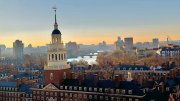Harvard College announced this evening that 692 of 7,921 early-action applicants were admitted to the class of 2028. This 8.7 percent acceptance rate compares to 7.5 percent in 2022 and 7.9 percent in 2021. The number of early applicants is down significantly from recent years, perhaps reflecting a return to more normal conditions and application patterns after the pandemic: the range from 9,406 to 10,086 early applicants during the 2020 to 2022 application cycles far exceeded the volume received in the years immediately preceding. This application season also takes place amid the turmoil on this and other campuses since the Middle East war set off by the terrorist Hamas attack on Israel October 7, so it will be interesting to see whether other schools’ early-applicant pools have changed, too.
Moreover, this is the first cohort of applicants admitted since the Supreme Court last June outlawed the consideration of race in admissions, upending a half-century of affirmative action processes based on Harvard’s “holistic review” practices in evaluating candidates. Harvard has changed its practices to comply with the ruling (for example, making sure that those who read applications do not have access to individuals’ information or aggregated data about race or ethnicity; updating training for application readers and alumni interviewers; and changing application essay prompts). Like Yale and other institutions, Harvard has now joined a consortium to reach prospective applicants in rural communities, the Small Town Outreach, Recruitment, and Yield network, aiming to enhance awareness in places where attending the College may not be regularly considered an option. The College remains test-optional (applicants need not provide SAT or ACT scores, at least through the class of 2030), but Harvard has not yet detailed further changes in outreach, recruiting, or policies governing legacy and athletic preferences—all of which can have a bearing on the diversity of admitted classes within the new legal framework established by the Court.
Of the admitted cohort, 15.5 percent come from first-generation college backgrounds, continuing a trend (the figure was 14 percent for the class of 2027 early admits, and 12 percent the year before that). In light of the Supreme Court ruling, the College no longer provides information on the admitted students’ ethnic or racial background. Nor did the College announce the percent of students accepted who are eligible for federal Pell grants; the news announcement did note that among those accepted today, 20.8 percent had applications fees waived because of financial need, up from 19.7 percent last year. Some 22.3 percent are from New England, 20.8 percent from the mid-Atlantic, 14.5 percent from the South, 8.4 percent from the Midwest, 17.2 percent from the West, and nearly 17 percent from outside the United States (up significantly from 14.1 percent last year and 12.6 percent two years ago, during the pandemic).
Members of the class of 2028 whose family income is $85,000 or less will attend the College free of tuition, room, board, and fees—reflecting the increase in that threshold from $75,000 announced last spring. (Princeton and Stanford have not announced any change in their family $100,000 income threshold for free attendance.)
Students were notified of early action decisions at 7 p.m. today, and those admitted are not obligated to attend. They have until May 1 to make their final matriculation decision. The deadline to apply for regular decision is January 1. Students deferred during the early action review will be considered in the regular decision cycle, for which decisions are made in late March.
The College plans to welcome admitted students to campus for Visitas weekend April 14-15, when they can attend classes and learn about Harvard resources and opportunities.









